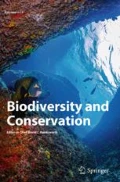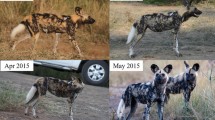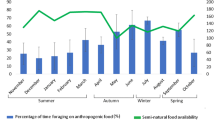Abstract
Understanding how threatened wildlife can coexist with humans over the long term is a central issue in conservation and wildlife management. Komodo National Park in Eastern Indonesia, harbors the largest extant populations of the endemic Komodo dragon (Varanus komodoensis). Consistent with global trends, this species is expected to be increasingly exposed to human activities and in particular growing ecotourism activities. Here we comprehensively evaluated how human activities affected individual and population level attributes of Komodo dragons. We compared Komodo dragons phenotypic (behaviour, body size, and body condition) and demographic (age structure, sex ratio, survival, and density) responses to variation in human activities across national park. Komodo dragons were found to exhibit pronounced responses to high human activity level relative to sites with low and negligible human activities. Komodo dragons exposed to ecotourism exhibited significantly less wariness, larger body mass, better body condition, and higher survival. These results are entirely consistent with ecotourism activities that provided Komodo dragons with long-term and substantial nutritional subsidies as a consequence of feeding and human food refuse. However, we also noted the potential negative consequences of altered behaviour and adult-biased populations in ecotourism areas which may influence demographic processes through intraspecific competition or predation. To address this issue, we recommend that three management strategies to be implemented in future include: (1) removal of human-mediated nutritional subsidies, (2) alternative ecotourism, and (3) spatial regulation of ecotourism. Furthermore, we advocate the development of approaches to achieve a socio–ecological sustainability that benefits both people and wildlife conservation.




Similar content being viewed by others
Data accessibility
Data will be made available from the Dryad Digital Repository on acceptance of publication.
References
Amo L, López P, Martın J (2006) Nature-based tourism as a form of predation risk affects body condition and health state of Podarcis muralis lizards. Biol Conserv 131:402–409
Ariefiandy A, Purwandana D, Natali C et al (2015) Conservation of Komodo dragons Varanus komodoensis in the Wae Wuul nature reserve, Flores, Indonesia: a multidisciplinary approach. Int Zoo Yearb 49:67–80
Ariefiandy A, Forsyth DM, Purwandana D et al (2016) Temporal and spatial dynamics of insular Rusa deer and wild pig populations in Komodo National Park. J Mammal. https://doi.org/10.1093/jmammal/gyw131
Arnason AN, Schwarz CJ (1995) POPAN-4: enhancements to a system for the analysis of mark-recapture data from open populations. J Appl Stat 22:785–800
Auffenberg W (1981) The behavioral ecology of Komodo monitor. University Presses of Florida, Gainesville
Balai Taman Nasional Komodo (2017) Statistik Balai TN Komodo tahun 2016. Balai Taman Nasional Komodo, Labuan Bajo
Balmford A, Green JMH, Anderson M et al (2015) Walk on the wild side: estimating the Global magnitude of visits to protected areas. PLoS Biol 13:1–6. https://doi.org/10.1371/journal.pbio.1002074
Battin J (2004) Bad habitats: animal ecological traps and the conservation of populations. Soc Conserv Biol 18:1482–1491
Beaver A (2005) Dictionary of travel and tourism terminology. CABI, Wallingford
Brunnschweiler JM, Baensch H (2011) Seasonal and long-term changes in relative abundance of bull sharks from a tourist shark feeding site in Fiji. PLoS ONE. https://doi.org/10.1371/journal.pone.0016597
Buckley RC (2011) Tourism and environment. Annu Rev Environ Resour 36:397–416. https://doi.org/10.1016/0160-7383(88)90091-6
Buckley RC, Castley JG, de Pegas FV et al (2012) A population accounting approach to assess tourism contributions to conservation of IUCN-Redlisted mammal species. PLoS ONE 7:1–8. https://doi.org/10.1371/journal.pone.0044134
Buckley RC, Morrison C, Castley JG (2016) Net effects of ecotourism on threatened species survival. PLoS ONE 11:23–25. https://doi.org/10.1371/journal.pone.0147988
Butchart SHM, Walpole M, Collen B et al (2010) Global biodiversity : indicators of recent declines. Science 328:1164–1168
Carter NH, Shrestha BK, Karki JB et al (2012) Coexistence between wildlife and humans at fine spatial scales. Proc Natl Acad Sci 109:15360–15365. https://doi.org/10.1073/pnas.1210490109
Ciofi C, de Boer ME (2004) Distribution and conservation of the komodo monitor (Varanus komodoensis). Herpetol J 14:99–107
Curtin S, Kragh G (2014) Wildlife tourism: reconnecting people with nature. Hum Dimens Wildl 19:545–554. https://doi.org/10.1080/10871209.2014.921957
Kehutanan, Kementerian Lingkungan Hidup dan (2015) Rencana Strategis Direktorat Pemanfaatan Jasa Lingkungan Hutan Konservasi Tahun 2015–2019. Bogor, Indonesia
Dempster T, Sanchez-Jerez P, Fernandez-Jover D et al (2011) Proxy measures of fitness suggest coastal fish farms can act as population sources and not ecological traps for wild gadoid fish. PLoS ONE 6:1–9. https://doi.org/10.1371/journal.pone.0015646
Dyck MG, Baydack RK (2004) Vigilance behaviour of polar bears (Ursus maritimus) in the context of wildlife-viewing activities at Churchill, Manitoba, Canada. Biol Conserv 116:343–350. https://doi.org/10.1016/S0006-3207(03)00204-0
Ellenberg U, Mattern T, Seddon PJ, Jorquera GL (2006) Physiological and reproductive consequences of human disturbance in Humboldt penguins: the need for species-specific visitor management. Biol Conserv 133:95–106. https://doi.org/10.1016/j.biocon.2006.05.019
Erb M (2015) Sailing to Komodo: contradictions of tourism and development in eastern Indonesia. Austrian J South-East Asian Stud 8:143–164. https://doi.org/10.14764/10.ASEAS-2015.2-3
Fletcher RJ, Orrock JL, Robertson BA (2012) How the type of anthropogenic change alters the consequences of ecological traps. Proc R Soc B 279:2546–2552. https://doi.org/10.1098/rspb.2012.0139
Gilroy JJ, Sutherland WJ (2007) Beyond ecological traps: perceptual errors and undervalued resources. Trends Ecol Evol 22:351–356. https://doi.org/10.1016/j.tree.2007.03.014
Goodwin H (2002) Local community involvement in tourism around National Parks: opportunities and constraints. Curr Issues Tour 5:338–360. https://doi.org/10.1080/13683500208667928
Hakim L (2017) Managing biodiversity for a competitive ecotourism industry in tropical developing countries: new opportunities in biological fields. AIP Conf Proc. https://doi.org/10.1063/1.5012708
Halverson J, Spelman L (2002) Sex determination and its role in management. In: Murphy JB, Ciofi C, de La Panouse C, Walsh T (eds) Komodo dragons: biology and conservation. Smithsonian Institution Press, Washington
Herrero S, Smith T, DeBruyn TD et al (2005) Brown bear habituation to people—safety, risks, and benefits. Wildl Soc Bull 33:362–373. https://doi.org/10.2193/0091-7648(2005)33[362:FTFBBH]2.0.CO;2
Higginbottom K (ed) (2004) Wildlife tourism: impacts, management, and planning. Common Ground Publishing, Altona
Imansyah MJ, Jessop TS, Ciofi C et al (2008) Ontogenetic differences in the spatial ecology of immature Komodo dragons. J Zool 274:107–115
Iriyono S, Adnan A, Nur MP et al (2012) Zonasi Taman Nasional Komodo, Kabupaten Manggarai Barat, Provinsi Nusa Tenggara Timur. Komodo National Park Authority, Labuan Bajo
Jessop TS, Madsen T, Sumner J et al (2006) Maximum body size among insular Komodo dragon populations covaries with large prey density. Oikos 112:422–429. https://doi.org/10.1111/j.0030-1299.2006.14371.x
Jessop TS, Madsen T, Ciofi C et al (2007) Island differences in population size structure and catch per unit effort and their conservation implications for Komodo dragons. Biol Conserv 135:247–255. https://doi.org/10.1016/j.biocon.2006.10.025
Jessop TS, Smissen P, Scheelings F, Dempster T (2012) Demographic and phenotypic effects of human mediated trophic subsidy on a large Australian lizard (varanus varius): meal ticket or last supper? PLoS ONE. https://doi.org/10.1371/journal.pone.0034069
Knight RL, Cole DN (1991) Effects of recreational activity on wildlife in wildlands. In: Transactions of the North American Wildlife and Natural Resources Conference, pp 238–247
Krüger O (2005) The role of ecotourism in conservation: panacea or Pandora’s box? Biodivers Conserv 14:579–600. https://doi.org/10.1007/s10531-004-3917-4
Kvarnemo C, Ahnesjo I (1996) The dynamics of operational sex ratios and competition for mates. Trends Ecol Evol 11:404–408. https://doi.org/10.1016/0169-5347(96)10056-2
Laver RJ, Purwandana D, Ariefiandy A et al (2012) Life-History and spatial determinants of somatic growth dynamics in Komodo dragon populations. PLoS ONE 7:1–10. https://doi.org/10.1371/journal.pone.0045398
Macdonald C, Gallagher AJ, Barnett A et al (2017) Conservation potential of apex predator tourism. Biol Conserv 215:132–141. https://doi.org/10.1016/j.biocon.2017.07.013
Massé S, Dussault C, Dussault C, Ibarzabal J (2014) How artificial feeding for tourism-watching modifies black bear space use and habitat selection. J Wildl Manage 78:1228–1238. https://doi.org/10.1002/jwmg.778
Monk K, De Fretes Y, Reksodiharjo-Lilley G (2013) Ecology of Nusa Tenggara and Maluka. Tuttle Publishing, Clarendon
Orams MB (2002) Feeding wildlife as a tourism attraction: a review of issues and impacts. Tour Manag 23:281–293. https://doi.org/10.1016/S0261-5177(01)00080-2
Oro D, Cam E, Pradel R, Martínez-Abraín A (2004) Influence of food availability on demography and local population dynamics in a long-lived seabird. Proc R Soc London Ser B 271:387–396
Papouchis CM, Singer FJ, Sloan WB (2001) Responses of desert bighorn sheep to increased human recreation. J Wildl Manage 65:573–582
Purwandana D, Ariefiandy A, Imansyah MJ et al (2014) Demographic status of Komodo dragons populations in Komodo National Park. Biol Conserv 171:29–35. https://doi.org/10.1016/j.biocon.2014.01.017
Purwandana D, Ariefiandy A, Imansyah MJ et al (2015) Evaluating environmental, demographic and genetic effects on population-level survival in an island endemic. Ecography (Cop) 38:1060–1070. https://doi.org/10.1111/ecog.01300
Rai SC (2012) Ecotourism and biodiversity conservation. Nova Science Publishers Inc, New York
Ramono WS, Wawandono NB, Subijanto J (2000) Rencana pengelolaan 25 Tahun Taman Nasional Komodo buku 1 rencana pengelolaan. Komodo National Park Authority, Labuan Bajo
Rodriguez-Prieto I, Fernández-Juricic E, Martín J, Regis Y (2009) Antipredator behavior in blackbirds: habituation complements risk allocation. Behav Ecol 20:371–377. https://doi.org/10.1093/beheco/arn151
Romero LM, Wikelski M (2002) Exposure to tourism reduces stress-induced corticosterone levels in Gala´ pagos marine iguanas. Biol Conserv 108:371–374.
Schaub M, Gimenez O, Schmidt BR, Pradel R (2004) Estimating survival and temporary emigration in the multistate capture-recapture framework. Ecology 85:2107–2113
Schoenecker KA, Krausman PR (2002) Human disturbance in bighorn sheep habitat, Pusch Ridge Wilderness, Arizona. J Arizona-Nevada Acad Sci 34:63–68
Schulte-Hostedde AI, Zinner B, Millar JS, Hickling GJ (2005) Restitution of mass–size residuals: validating body condition indices. Ecology 86:155–163.
Schwarz CJ, Arnason AN (1996) A general methodology for the analysis of capture-recapture experiments in open populations. Biometrics 52:860–873
Smith GR, Iverson JB (2016) Effects of tourism on body size, growth, condition, and demography in the Allen Cays Iguana, Cyclura cychlura inornata, on Leaf Cay, The Bahamas. Herpetol Conserv Biol 11:214–221
Vitousek PM, Mooney HA, Lubchenco J, Melillo JM (1997) Human domination of earth’ s ecosystems. Science 277:494–499. https://doi.org/10.1126/science.277.5325.494
Walpole MJ (2001) Feeding dragons in Komodo National Park: a tourism tool with conservation implications. Anim Conserv 4:67–73. https://doi.org/10.1017/S136794300100107X
Walpole MJ, Goodwin HJ (2000) Local economic impacts of dragon tourism in Indonesia. Ann Tour Res 27:559–576
Walsh SJ, Mena CF (2016) Interactions of social, terrestrial, and marine sub-systems in the Galapagos Islands, Ecuador. Proc Natl Acad Sci USA 113:14536–14543. https://doi.org/10.1073/pnas.1604990113
White GC, Burnham KP (1999) Program MARK: survival estimation from populations of marked animals. Bird Study 46:S120–S139. https://doi.org/10.1080/00063659909477239
Williams BK, Nichols JD, Conroy MJ (2002) Analysis and management of animal populations: modeling, estimation and decision making. Academic Press, San Diego
Acknowledgements
We thank Komodo National Park staff, field assistants, and Muhamad Azmi who assisted us with different facets of this study. Major funding for this study (2002–2006) was awarded to TSJ via a Conservation Research Postdoctoral Fellowship from the Zoological Society of San Diego. Later funding support (2007 onwards) was provided by the Komodo Species Survival Plan of the Association of Zoo and Aquarium. This research was conducted via Memorandum of Understanding (MOU) between the Zoological Society of San Diego, and the Indonesian Department of Forestry and Conservation (PHKA) or via a Cooperation Agreement (PK) between Komodo Survival Program and Komodo National Park.
Author information
Authors and Affiliations
Contributions
AR, TSJ, and AA conceived the ideas and designed the study; DP, AA, MJI, TSJ, and AR collected the data; TSJ analyzed the data; AR and TSJ led the writing of manuscript. All authors contributed to the drafts and gave final approval for publication.
Corresponding author
Additional information
Communicated by David Hawksworth.
This article belongs to the Topical Collection: Biodiversity exploitation and use.
Rights and permissions
About this article
Cite this article
Ardiantiono, Jessop, T.S., Purwandana, D. et al. Effects of human activities on Komodo dragons in Komodo National Park. Biodivers Conserv 27, 3329–3347 (2018). https://doi.org/10.1007/s10531-018-1601-3
Received:
Revised:
Accepted:
Published:
Issue Date:
DOI: https://doi.org/10.1007/s10531-018-1601-3




